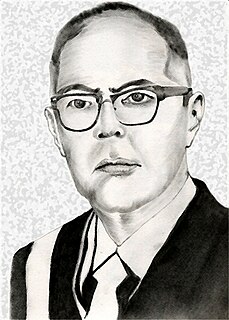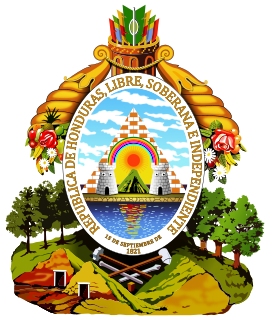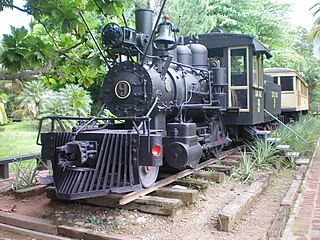Direct popular general elections (Spanish : Elecciones generales de Honduras de 1963) were scheduled in Honduras for 13 October 1963.

Spanish or Castilian is a Romance language that originated in the Castile region of Spain and today has hundreds of millions of native speakers in the Americas and Spain. It is a global language and the world's second-most spoken native language, after Mandarin Chinese.

Honduras, officially the Republic of Honduras, is a country in Central America. In the past, it was sometimes referred to as "Spanish Honduras" to differentiate it from British Honduras, which later became modern-day Belize. The republic of Honduras is bordered to the west by Guatemala, to the southwest by El Salvador, to the southeast by Nicaragua, to the south by the Pacific Ocean at the Gulf of Fonseca, and to the north by the Gulf of Honduras, a large inlet of the Caribbean Sea.
The Liberal Party of Honduras selected Modesto Rodas Alvarado, even though the president Ramón Villeda Morales favoured another candidate. Villeda and most of the party maintained unity. [1]

The Liberal Party of Honduras is a centre-right liberal political party in Honduras that was founded in 1891. The party is a member of the Liberal International. The PLH is identified with the color red and white, as the flag Francisco Morazan used in most of his military campaigns during time of the Central American Federal Republic.
Modesto Rodas Alvarado was a prominent Honduran lawyer and politician who served as President of the National Congress of Honduras between 1957 and 1963.

José Ramón Adolfo Villeda Morales served as President of Honduras from 1957 to 1963.
The National Party of Honduras nomination of Ramón Ernesto Cruz Uclés “... marked the requiem once and for all of the forty-year domination of Tiburcio Carías Andino over the National party. Because Cruz defeated Carías’ son, Gonzalo Carías Castillo, by just three votes in the convention”. [2] Immediately after the May convention, Carías resigned as the party’s jefe supreme and with his son formed the Popular Progressive Party of Honduras. [3]

The National Party of Honduras is a political party in Honduras founded on February 27, 1902, by Manuel Bonilla Chirinos. Historically it has been one of the two most influential parties in the country. The party's platform is based on Christian humanist doctrine, and its five main principles are common wealth, dignity of the human person, equality, solidarity and subsidiarity.

Ramón Ernesto Cruz Uclés was the President of Honduras from 7 June 1971 to 4 December 1972.

Tiburcio Carías Andino was a Honduran military man with a reputation as a strongman. He founded the National Party of Honduras in 1918, and was President of Honduras twice; briefly in 1924 and from 1933 to 1949.
“The 1963 election campaign favored Modesto Rodas Alvarado, the charismatic and fiery former president of the Constitutional Assembly, who promised to large campaign crowds that he would reduce the power of the military. There was a ground swell of support from various sectors of Honduran society to follow the Costa Rican model and proscribe the military”. [4]
“Ten days before the 1963 presidential elections, the military, fearful of Villeda Morales’s establishment of a Civil Guard independent of the military and encouraged by the fruit companies and domestic landlords, successfully overthrew the Villeda Morales government and canceled the elections, which probably would have been won by a Liberal colleague of the president’s. Although the Kennedy administration refused to grant U.S. diplomatic recognition to the new regime, the Johnson administration did so a year later”. [5]





